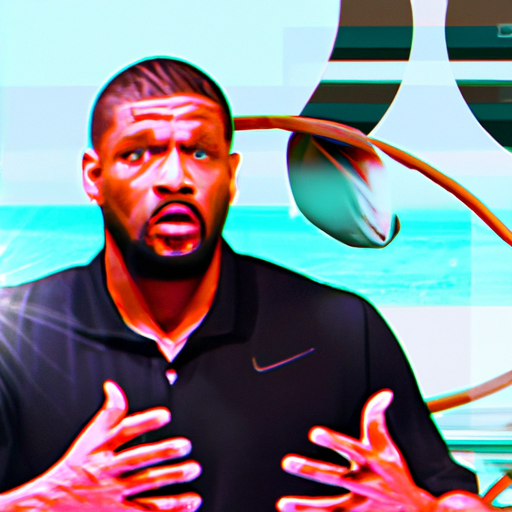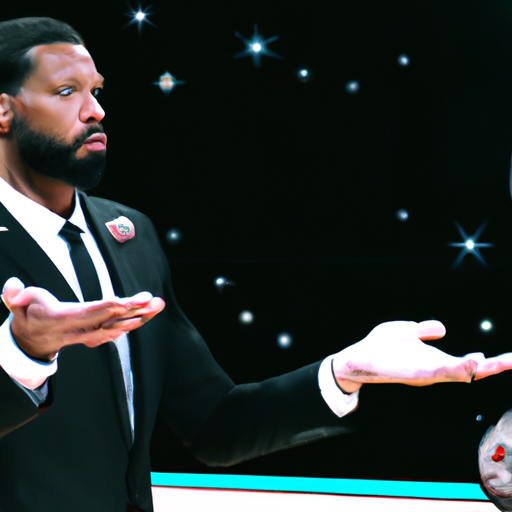Udonis Haslem slams Paul Pierce’s hot take on being better than Dwyane Wade

Udonis Haslem’s Response to Paul Pierce’s Claim
Udonis Haslem, the veteran power forward for the Miami Heat, recently took to social media to respond to Paul Pierce’s claim that he was a better player than his former teammate, Dwyane Wade. Pierce, a former NBA player himself, made this controversial statement during a recent appearance on ESPN’s “NBA Countdown.” Haslem’s response was swift and direct, as he defended his longtime friend and teammate.
In his Instagram post, Haslem expressed his disbelief at Pierce’s assertion, stating that it was “disrespectful” to compare himself to Wade. He emphasized the impact that Wade had on the Miami Heat franchise, leading them to three NBA championships and being the face of the team for over a decade. Haslem highlighted Wade’s numerous accolades, including his 13 All-Star selections and his status as the Heat’s all-time leading scorer.
Haslem also pointed out that Wade’s impact extended beyond the basketball court. He praised Wade’s philanthropic efforts and his role as a leader in the community. Haslem emphasized that Wade’s contributions to the Miami community were immeasurable and went far beyond his on-court achievements.
Furthermore, Haslem addressed Pierce’s claim that he had a better career than Wade by pointing out the statistical differences between the two players. He highlighted Wade’s superior career averages in points, assists, and steals, as well as his higher shooting percentages. Haslem also mentioned that Wade had been named to the All-NBA First Team twice, while Pierce had never received that honor.
Haslem’s response to Pierce’s claim was not only a defense of Wade but also a reflection of the deep bond and loyalty that exists among teammates. He emphasized the importance of unity and support within a team, stating that it was crucial to stand up for one another in the face of criticism.
The response from fans and fellow players was overwhelmingly in support of Haslem’s defense of Wade. Many praised Haslem for his loyalty and for speaking out against what they perceived as an unjust comparison. Former NBA players, including Shaquille O’Neal and Tracy McGrady, also weighed in, expressing their agreement with Haslem’s sentiments.
This incident serves as a reminder of the ongoing debates and discussions that surround the comparison of players’ careers and legacies. It is not uncommon for former players to make bold claims about their own abilities or achievements, often sparking controversy and heated discussions among fans and analysts.
In the case of Paul Pierce’s claim, Udonis Haslem’s response was a powerful statement of support for his teammate and friend. It highlighted the respect and admiration that exists among players who have shared the court and the bond that is formed through years of competing together.
Ultimately, the debate over who is the better player, Paul Pierce or Dwyane Wade, is subjective and open to interpretation. However, Haslem’s response serves as a reminder that loyalty and support among teammates should always be valued and celebrated.
Analyzing Dwyane Wade’s Impact on the NBA

Udonis Haslem, the long-time teammate and close friend of Dwyane Wade, recently took to social media to express his disagreement with Paul Pierce’s claim that he was a better player than Wade. Haslem’s response ignited a heated debate among basketball fans, prompting a closer examination of Wade’s impact on the NBA.
To fully understand the significance of Wade’s contributions to the league, one must delve into his illustrious career. Drafted by the Miami Heat in 2003, Wade quickly established himself as a force to be reckoned with. His explosive athleticism, unmatched scoring ability, and tenacious defense made him a nightmare for opponents. Wade’s impact was felt immediately, as he led the Heat to their first-ever NBA championship in 2006, earning himself the Finals MVP award in the process.
But Wade’s impact extended far beyond his individual accolades. He revolutionized the shooting guard position, showcasing a unique blend of finesse and power that had rarely been seen before. His ability to attack the rim with relentless aggression, combined with his exceptional court vision, made him a nightmare to defend. Wade’s style of play inspired a new generation of players, who sought to emulate his fearless approach to the game.
Furthermore, Wade’s impact on the NBA can be measured by his influence off the court. He was a vocal advocate for social justice issues, using his platform to raise awareness and effect change. Wade’s philanthropic efforts, particularly in his hometown of Chicago, have left a lasting impact on communities in need. His commitment to making a difference both on and off the court has solidified his status as a role model for aspiring athletes.
In contrast, Paul Pierce, while undoubtedly a talented player in his own right, falls short when compared to Wade’s impact on the NBA. Pierce’s career was marked by inconsistency and a lack of team success. While he did win a championship with the Boston Celtics in 2008, it was largely due to the contributions of his teammates, including Kevin Garnett and Ray Allen. Wade, on the other hand, consistently elevated his team’s performance and was the driving force behind the Heat’s success.
It is important to note that comparing players from different eras is a challenging task. The game has evolved significantly since Pierce and Wade’s prime, with different rules and styles of play. However, when evaluating their impact on the NBA, it becomes clear that Wade’s contributions far outweigh those of Pierce.
In conclusion, Udonis Haslem’s response to Paul Pierce’s claim that he was a better player than Dwyane Wade has sparked a discussion about Wade’s impact on the NBA. Wade’s exceptional skills, leadership, and off-court contributions have solidified his status as one of the game’s all-time greats. While Pierce was undoubtedly a talented player, his career pales in comparison to Wade’s. Ultimately, Wade’s impact on the NBA transcends statistics and individual accolades, leaving an indelible mark on the league and inspiring future generations of players.
Comparing the Legacies of Paul Pierce and Dwyane Wade
Udonis Haslem, the long-time teammate of Dwyane Wade, recently took to social media to express his disagreement with Paul Pierce’s claim that he had a better career than Wade. The debate surrounding the legacies of these two NBA legends has been a topic of discussion among basketball fans for years. While both players have had remarkable careers, it is essential to examine their achievements and impact on the game to determine who truly had the better legacy.
Dwyane Wade, a three-time NBA champion, is widely regarded as one of the greatest shooting guards in NBA history. Throughout his 16-year career, Wade consistently showcased his exceptional skills, leadership, and ability to perform under pressure. His impact on the Miami Heat franchise cannot be overstated, as he played a pivotal role in leading the team to their first NBA championship in 2006.
In addition to his championships, Wade’s individual accolades speak volumes about his greatness. He was selected to the All-NBA First Team twice and the All-NBA Second Team three times. Wade was also named the NBA Finals MVP in 2006, further solidifying his status as a clutch performer. His ability to rise to the occasion in crucial moments is a testament to his mental toughness and competitiveness.
On the other hand, Paul Pierce, a one-time NBA champion, had an impressive career of his own. Pierce spent the majority of his career with the Boston Celtics, where he formed a formidable “Big Three” alongside Kevin Garnett and Ray Allen. Together, they won the NBA championship in 2008, ending the Celtics’ 22-year title drought.
While Pierce’s championship win is undoubtedly significant, it is important to note that he was surrounded by a talented supporting cast. Garnett and Allen played crucial roles in the Celtics’ success, making it difficult to solely attribute the championship to Pierce’s individual brilliance. In contrast, Wade was the driving force behind the Miami Heat’s success, often carrying the team on his back during critical moments.
Furthermore, when comparing their individual achievements, Wade’s resume shines brighter. He was selected to the All-NBA First Team three times, the All-NBA Second Team twice, and the All-NBA Third Team three times. Wade also won the NBA scoring title in 2009, showcasing his ability to dominate games offensively. These accolades highlight his consistent excellence throughout his career.
While statistics and accolades are essential in evaluating a player’s legacy, it is also crucial to consider their impact on the game and their respective franchises. Wade’s impact on the Miami Heat cannot be overstated. He brought a level of excitement and success to the franchise that had never been seen before. His leadership and ability to elevate his teammates’ performances were instrumental in the Heat’s success.
In contrast, Pierce’s impact on the Celtics, while significant, does not match Wade’s. The Celtics had a storied history before Pierce’s arrival, and while he played a crucial role in their championship run, his impact on the franchise’s overall legacy is not as profound.
In conclusion, while both Paul Pierce and Dwyane Wade had remarkable careers, it is clear that Wade’s legacy surpasses Pierce’s. Wade’s individual achievements, leadership, and impact on the Miami Heat franchise set him apart from Pierce. Udonis Haslem’s criticism of Pierce’s claim is justified, as the evidence overwhelmingly supports Wade as the superior player. As basketball fans, we should appreciate the greatness of both players, but it is essential to recognize and acknowledge the true extent of their legacies.

